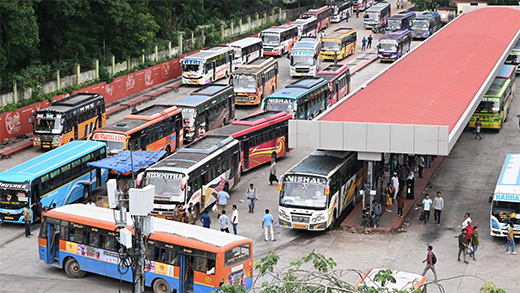
Mangalore University to document contributions of coastal private bus sector towards growth of the region
Mangalore Today News Network
Mangaluru, July 11, 2024: Mangalore University is set to document the contributions of over-a-century old coastal private bus sector for the overall development of coastal region, by setting up a study chair.
After holding rounds of meetings with private bus operators, the university has begun the move to set up the chair and prepare the document through research and data.

Vice-Chancellor of the university P. L. Dharma told The Hindu that with 110-year history, private bus services particularly in the undivided Dakshina Kannada (comprising the present Udupi district) have emerged as “Mangaluru model”. Their contributions to the growth of mobility and economy in the coastal region are immense.
First bus service
The first private bus service was launched in Dakshina Kannada in 1914 from Mangaluru to Bantwal by Manjunatha Travels.
Mr. Dharma, who took charge four months ago, said that private bus services in addition to offering direct employment to many, have created indirect jobs. They offered business to automobile workshops, tyre puncture shops, electricians, painters, spare parts shops and the like. Their contributions to the growth of tourism can not be ignored.
Stating that the private bus operators offered the services like a “parallel state”, the Vice-Chancellor said that there is a need to introduce this “Mangaluru model” across the country. “Once documented, its copies will be sent to the State, Union, and other State government authorities to take a cue from the Mangaluru model,” Mr. Dharma said.
Referring to how private buses offered connectivity to remote areas the Vice-Chancellor said that Perande near Konaje had about 10 houses. Some private buses operated from Mangaluru till Perande though operating buses for an area having about 10 houses is not economically viable. There is another such remote location near Bajpe to where private buses offered their services.
Mr. Dharma said there is a history of private buses acting as cargo movers for farmers in villages from Bunder area in Mangaluru. Farmers depended on private buses to get farm implements and equipment from the main trade centre Bunder. “The concept of courier movement had taken birth in Dakshina Kannada much earlier. Private buses had realised it then,” he said.
Mr. Dharma said that private bus operators also contributed to communal harmony. “A majority of Hindus worked in buses operated by Muslim owners while at the same time many Muslims worked in buses operated by Hindu owners. They celebrated many festivals together without any distinction,” he said.
The bus operators have been requested to institute a fund of ₹25 lakh in the proposed chair, Mr. Dharma said.
City and service buses
Dilraj Alva, former president of Dakshina Kannada Bus Operators’ Association, a body of Mangaluru city bus owners, said that the city now had 325 buses. The Canara Bus Owners’ Association (comprising Dakshina Kannada and Udupi districts) operated service buses and inter-district buses. There are 1,500 such buses now, he said.
Mr. Alva said that the bus operators have suggested to the university to widen the scope of the proposed study chair to cover the entire transport industry of the twin districts.